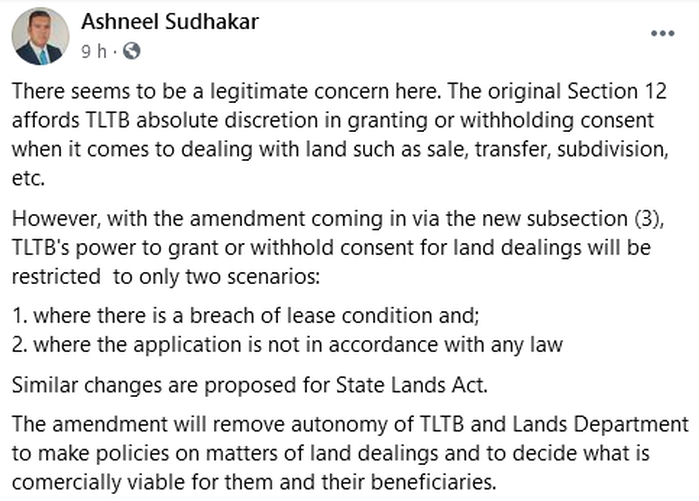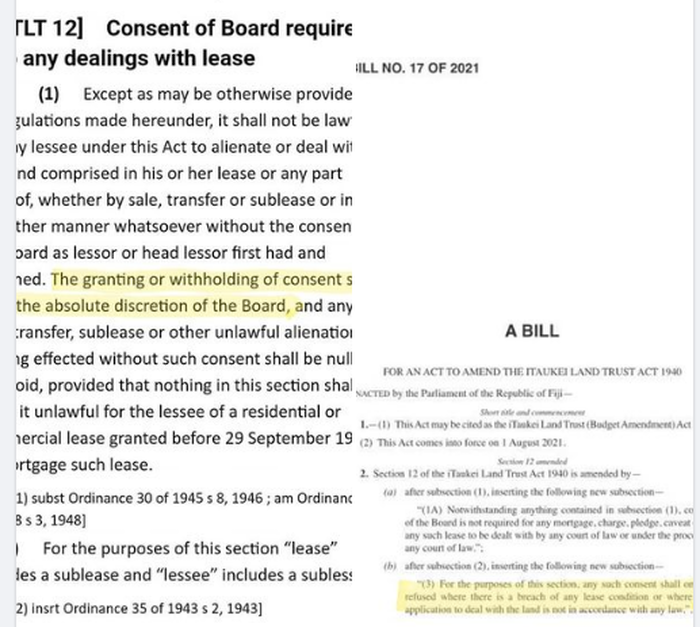"The government's justification for the amendments citing a backlog of applications does not make sense. It is just like saying we have too many cars so let's do away with roadworthiness tests or we have too many ships so let's forget about seaworthiness tests or that we have too many aeroplanes (which we have) so let's throw airworthiness tests out of the window..More relevant example in today's times would be that there are too many covid cases so let's not do any more swab tests! What chaos that will create. Simple administrative changes could have fixed the backlog issue." - Ashneel Sudhakar
By ASHNEEL SUDHAKAR
With the Land Law Amendment debate raging on, I thought to add in my explanation on the issue as well in simple terms.
The proposed amendments essentially touch on three aspects:
Consent of the lessor as the case may be (TLTB for native land or Lands Department for crown land) will no longer be required for:
1. Mortgages
2. Institution of legal proceedings
3. Connection of utilities such as water and electricity.
Firstly, the government's justification for the amendments citing a backlog of applications does not make sense. It is just like saying we have too many cars so let's do away with roadworthiness tests or we have too many ships so let's forget about seaworthiness tests or that we have too many aeroplanes (which we have) so let's throw airworthiness tests out of the window.
More relevant example in today's times would be that there are too many covid cases so let's not do any more swab tests! What chaos that will create.
Simple administrative changes could have fixed the backlog issue.
1. Mortgage
The word mortgage is derived from a French term meaning "death pledge" and refers to the pledge ending (dying) when either the obligation is fulfilled, the property is sold by the bank or the property is taken through foreclosure.
Once the mortgage is registered the Bank becomes the legal owner and the lessee become the equitable owner. Whatever the terms and conditions of the mortgage may be (which are quite strict usually) or legal arguments on both sides are, it is morally only right that TLTB as trustee of native land on behalf of the mataqali and Lands Department as custodians of crown land have knowledge when their property is pledged in such a rigid manner by their lessees. It's not just about saving $109 in consent fees. The land is not yours; you are just renting/leasing it for a term after which it will return to the owner.
Put in simple terms, if you are renting a house it should not be open to you to rent out or mortgage or pledge a room, kitchen or garage to another person without the permission of the landlord.
2. Legal Proceedings
Courts have wide ranging powers. The reason for seeking consent of TLTB or Lands Dept before instituting legal proceedings is to ensure that the lessor knows what the applicant seeks is not something which is undesirable to the lessor. If the lessee is seeking something which would not usually be allowed, the lessor can refuse consent. (The court may make the lessor a party to participate in the proceedings or to advise the court but many times this is not done.)
For example if two people apply to subdivide land among themselves and the lessor refuses consent, one party can sue the other in a planned court action and enter judgement by consent. The issue of consent to the dealing may be brought up in court but lawyers who have practised litigation will tell you that when matters are settled out of court and consent judgement is entered, legal matters are not usually brought up.
If the courts are not careful and do not scrutinise the application in light of Section 12 of the iTaukei Land Trust Act or Section 13 of the State Lands Act and the lessor is not a party the court proceedings such a dealing could pass under their radar. Consent judgements can be used to get something which the lessor had refused initially. It is rare but similar circumventing of the processes have happened before.
3. Water and Electricity Connections
We already have the problem of increasing squatter settlements and illegal construction. The purpose of obtaining consent for connection of water and electricity was that it provided a window of opportunity for the lessor to check if the building was built on their land legally.
For a long time EFL and WAF required title or lease documents before approving connections. Recently for squatter settlements and illegal buildings a temporary consent was made possible by the lessor on humanitarian grounds. That ensured that the illegal building would be brought within the knowledge of the lessor which is important for future planning, relocation, etc.
The consent requirement was there for a purpose. These hasty changes are bound to cause friction among people and legal problems later.
It should be noted that these provisions have been untouched since the 1940s. In law it is said that if a legal provision has withstood the test of time it must be good law and should not be easily disturbed. We might just be creating new problems instead of solving old ones.
As these old sayings go;
"Don't ever take a fence down until you know the reason it was put up" and "If it ain't broke, don't fix it"
With the Land Law Amendment debate raging on, I thought to add in my explanation on the issue as well in simple terms.
The proposed amendments essentially touch on three aspects:
Consent of the lessor as the case may be (TLTB for native land or Lands Department for crown land) will no longer be required for:
1. Mortgages
2. Institution of legal proceedings
3. Connection of utilities such as water and electricity.
Firstly, the government's justification for the amendments citing a backlog of applications does not make sense. It is just like saying we have too many cars so let's do away with roadworthiness tests or we have too many ships so let's forget about seaworthiness tests or that we have too many aeroplanes (which we have) so let's throw airworthiness tests out of the window.
More relevant example in today's times would be that there are too many covid cases so let's not do any more swab tests! What chaos that will create.
Simple administrative changes could have fixed the backlog issue.
1. Mortgage
The word mortgage is derived from a French term meaning "death pledge" and refers to the pledge ending (dying) when either the obligation is fulfilled, the property is sold by the bank or the property is taken through foreclosure.
Once the mortgage is registered the Bank becomes the legal owner and the lessee become the equitable owner. Whatever the terms and conditions of the mortgage may be (which are quite strict usually) or legal arguments on both sides are, it is morally only right that TLTB as trustee of native land on behalf of the mataqali and Lands Department as custodians of crown land have knowledge when their property is pledged in such a rigid manner by their lessees. It's not just about saving $109 in consent fees. The land is not yours; you are just renting/leasing it for a term after which it will return to the owner.
Put in simple terms, if you are renting a house it should not be open to you to rent out or mortgage or pledge a room, kitchen or garage to another person without the permission of the landlord.
2. Legal Proceedings
Courts have wide ranging powers. The reason for seeking consent of TLTB or Lands Dept before instituting legal proceedings is to ensure that the lessor knows what the applicant seeks is not something which is undesirable to the lessor. If the lessee is seeking something which would not usually be allowed, the lessor can refuse consent. (The court may make the lessor a party to participate in the proceedings or to advise the court but many times this is not done.)
For example if two people apply to subdivide land among themselves and the lessor refuses consent, one party can sue the other in a planned court action and enter judgement by consent. The issue of consent to the dealing may be brought up in court but lawyers who have practised litigation will tell you that when matters are settled out of court and consent judgement is entered, legal matters are not usually brought up.
If the courts are not careful and do not scrutinise the application in light of Section 12 of the iTaukei Land Trust Act or Section 13 of the State Lands Act and the lessor is not a party the court proceedings such a dealing could pass under their radar. Consent judgements can be used to get something which the lessor had refused initially. It is rare but similar circumventing of the processes have happened before.
3. Water and Electricity Connections
We already have the problem of increasing squatter settlements and illegal construction. The purpose of obtaining consent for connection of water and electricity was that it provided a window of opportunity for the lessor to check if the building was built on their land legally.
For a long time EFL and WAF required title or lease documents before approving connections. Recently for squatter settlements and illegal buildings a temporary consent was made possible by the lessor on humanitarian grounds. That ensured that the illegal building would be brought within the knowledge of the lessor which is important for future planning, relocation, etc.
The consent requirement was there for a purpose. These hasty changes are bound to cause friction among people and legal problems later.
It should be noted that these provisions have been untouched since the 1940s. In law it is said that if a legal provision has withstood the test of time it must be good law and should not be easily disturbed. We might just be creating new problems instead of solving old ones.
As these old sayings go;
"Don't ever take a fence down until you know the reason it was put up" and "If it ain't broke, don't fix it"




